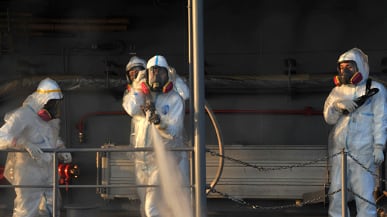Workers at Japan’s stricken nuclear power plants have begun releasing about 11,500 tons of radioactive water into the sea in order to make room in storage tanks for more severely contaminated water. The water being released contains levels of iodine-131 more than 100 times the legal limit, but the government says it poses no immediate health risk. The water it’s being released to make room for, on the other hand, is 100,000 times more radioactive than water in a normally functioning reactor. The contaminated water, left over from emergency attempts to cool the plant, must be removed so that workers can restore normal cooling functions, but it’s not clear how the water can be removed or where it can be stored. The intentional release comes after Tokyo Electric Power Company failed to plug an eight-inch crack in a pit near the No. 2 reactor that has been leaking radioactive water directly into the sea. Health ministry official Taku Ohara says the government is considering drawing up radioactivity food-safety standards for fish after high levels of radiation were detected in a bottom-feeding fish off the coast.
Read it at Los Angeles Times





